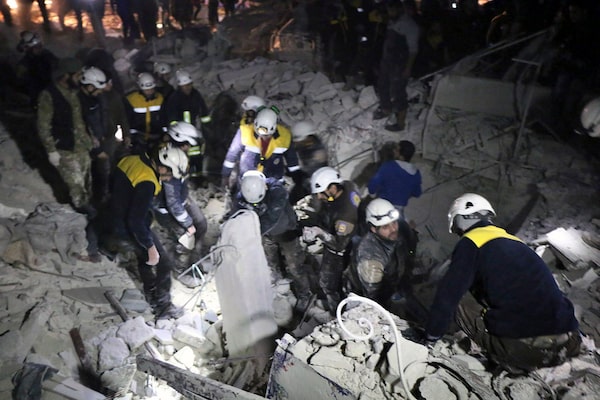
This Sunday, Jan. 7, 2018 photo provided by the Syrian Civil Defence White Helmets shows Civil Defence workers inspecting a damaged building after a bombing that targeted the office of a militant group consisting of foreign fighters in Idlib, Syria.Uncredited/The Associated Press
Mohammed Al Kholi, a volunteer humanitarian worker with the rescue group known as the White Helmets, spent his final hours in his homeland of Syria pulling bodies from bombed-out buildings and rushing injured civilians to hospital as government forces encircled, rapidly reclaiming territory in the southwestern region of the war-torn country.
He saved as many people as he could before he, his wife and four children were whisked out of Syria on July 21 during a daring overnight mission that saved them and other White Helmets from President Bashar al-Assad’s regime. As the family settles into their new home in Canada, Mr. Al Kholi cannot let go of the dangerous life they left behind – and the operation that got them out of it.
Mr. Al Kholi and his family were among more than 420 people – members of the White Helmets and their families - Canada helped evacuate from Syria this past summer. Dozens have resettled in Canada and are sharing harrowing stories from their time with the White Helmets, a civil-defence organization that has been credited with saving more than 100,000 civilians during Syria’s seven-year-old civil war.
Mr. Al Kholi, a 42-year-old former firefighter, arrived in Vancouver on Oct. 9 with his wife and four children. In an interview with The Globe and Mail, he said the rescued White Helmets spent the two days before the evacuation saving as many lives as possible while Syrian government jets dropped bombs.
“We were running from death to death,” Mr. Al Kholi said in Arabic, through a translator.
“We were stuck in an area on the border and we were only 150 metres away from the regime. Even during this time … I was going to rescue people, I was going to retrieve corpses and I was going to put out fires.”
The volunteers believed Mr. al-Assad and his Russian allies would show no mercy to any White Helmets they captured in the area. Eyewitness videos posted online by White Helmets rescuers have been pivotal in highlighting the use of chemical gas and other illegal weapons by Mr. al-Assad’s forces. Syrian and Russian media have accused the White Helmets of working for Western intelligence services and co-operating with “terrorist” groups opposed to Mr. al-Assad.
In an operation co-ordinated in part by the Canadian embassy in Amman, 106 White Helmets volunteers and their families crossed from Syria into the Israel-controlled Golan Heights during the night of July 21 and early morning of July 22. They were then packed onto buses and driven to Jordan, where they temporarily settled in the Azraq refugee camp.
The Israel Defence Forces led the rescue effort at the request of Canada, Britain and Germany, which all committed to resettling evacuees, along with France, Sweden and the Netherlands. The United States also supported the operation.
The White Helmets, officially called Syrian Civil Defence, were established in 2014 by Syrians from all walks of life - bakers, tailors, engineers, pharmacists, painters, carpenters and students – and have been nominated for the Nobel Peace Prize for their life-saving work. More than 200 White Helmets have been killed and countless others injured during their work in Syria.
During his time with the White Helmets, Mr. Al Kholi sustained physical injuries including a broken vertebrae in his neck, an injured knee, a damaged cornea and respiratory problems. But his mental health is suffering too, because each rescue still stains his memory.
He remembers one particular call to go to Daraa, not far from where he lived. When he arrived, he found a two-story house, which had been hit by a missile, completely under ground. The entire family, including six children, was killed.
“There is so much pain,” Mr. Al Kholi said. “Even though I now live in Canada … I can’t let go of everything I witnessed.”
Guilt also haunts Mayson al Masri, a White Helmet refugee who has resettled in Hamilton, Ont., with her husband. Ms. al Masri, a 44-year-old former journalist, said she had “mixed feelings” after landing in Canada.
“I feel like I got away from that hell. … At the same time, I am leaving my family behind,” she said in Arabic through a translator.
“My life here is filled with anxiety. Every time I dial the phone number [to Syria], I am afraid to hear bad news about someone, whether they’ve been detained or killed.”
The White Helmets in Canada are particularly worried about their colleagues in Syria who are still under threat from the Assad regime. Some 800 White Helmets were approved for the rescue effort in July, but only 422 made the journey to Israel and on to Jordan. Mr. Al Kholi said the remaining volunteers could face execution if the Assad forces find them.
Ms. al Masri and Mr. Al Kholi’s days have gone from responding to bombings and missile strikes in Syria to filling out resettlement paperwork, attending medical appointments and English classes in Canada. They hope to find meaningful work one day so they can provide for their families.
As much as they miss their home country, the White Helmets says they are eternally grateful to the Canadian government for helping them escape probable torture or even death in Syria. Canada’s Istanbul-based special envoy to Syria, Robin Wettlaufer, and Foreign Affairs Minister Chrystia Freeland have been credited with spearheading the mission.
“I can’t describe my feelings of gratitude to the government of Canada and also especially to Minister Freeland. She is an amazing person. She was our hope. She fought for us and did everything possible to help us,” Ms. al Masri said.
“We really were going through hell.”